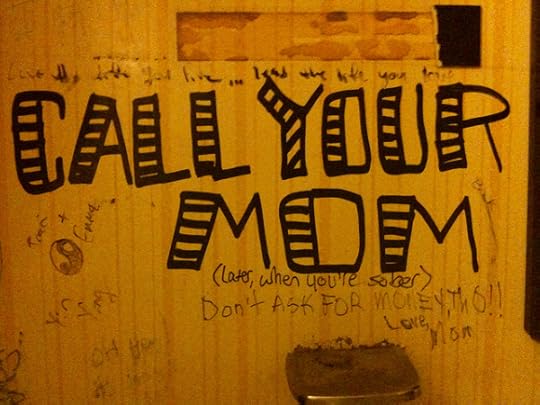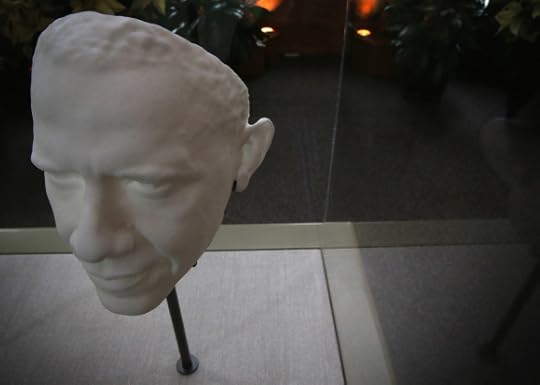Andrew Sullivan's Blog, page 69
December 6, 2014
The Consolations Of Poetry
From the Poetry archives, this essay from the late, great American philosopher, Richard Rorty, stands out as a lovely paean to verse. When Rorty learned he had the inoperable pancreatic cancer that would take his life, he reflected on what especially resonated in his reading:
Some months after I learned the bad news, I was sitting around having coffee with my elder son and a visiting cousin. My cousin (who is a Baptist minister) asked me whether I had found my thoughts turning toward religious topics, and I said no. “Well, what about philosophy?” my son asked. “No,” I replied, neither the philosophy I had written nor that which I had read seemed to have any particular bearing on my situation. I had no quarrel with Epicurus’s argument that it is irrational to fear death, nor with Heidegger’s suggestion that ontotheology originates in an attempt to evade our mortality. But neither ataraxia (freedom from disturbance) nor Sein zum Tode (being toward death) seemed in point.
“Hasn’t anything you’ve read been of any use?” my son persisted. “Yes,” I found myself blurting out, “poetry.” “Which poems?” he asked. I quoted two old chestnuts that I had recently dredged up from memory and been oddly cheered by, the most quoted lines of Swinburne’s “Garden of Proserpine”:
We thank with brief thanksgiving
Whatever gods may be
That no life lives for ever;
That dead men rise up never;
That even the weariest river
Winds somewhere safe to sea.
and Landor’s “On His Seventy-Fifth Birthday”:
Nature I loved, and next to Nature, Art;
I warmed both hands before the fire of life,
It sinks, and I am ready to depart.
I found comfort in those slow meanders and those stuttering embers. I suspect that no comparable effect could have been produced by prose. Not just imagery, but also rhyme and rhythm were needed to do the job. In lines such as these, all three conspire to produce a degree of compression, and thus of impact, that only verse can achieve. Compared to the shaped charges contrived by versifiers, even the best prose is scattershot.


Taking A Stand On The Can
Julie Beck looks at latrinalia, or bathroom graffiti:
While it would be impossible to come up with a comprehensive unified theory of why people write poop jokes and names with hearts around them while they’re on the pot (other than the perhaps scientifically unsatisfying “Because it’s fun”), there are several factors that seem to be at play. One is that bathroom graffiti is a forum for anonymous, often-inappropriate expression, not unlike an Internet comments section, except with the added bonus of creating something tangible that exists in the real world. Plus, as Matthews notes, “It’s still illegal. It’s deviant, but it’s a low-cost deviant thing to do.” There’s a low likelihood of getting caught, and it’s usually something that can be washed off, or painted over.
Toilet graffiti also offers an interesting contrast to the way people typically behave in the bathroom. The unspoken rules of keeping to oneself, not making eye contact, and avoiding talking to strangers, all contribute to a sometimes-tense environment with the goal of shifting focus away from what’s actually happening behind stall doors. But the graffiti on the stall doors does not ignore it one bit. It crudely acknowledges and pokes fun at what we all go to the bathroom to do, and flouts the politeness surrounding it as well.
(Photo by Flickr user liquidsunshine49)


A Poem For Saturday
Dish poetry editor Alice Quinn writes:
Mark Strand was (even for a poet) exceptionally captivated by a cat-and-mouse game – whimsical and profound – with the subject of death. He left this realm on Saturday, November 29th, to the great sorrow of his many, many dear friends and admirers. He was, I reckon, mostly cat in this fluidly shifting contest, empowered by the strength of his indelible and charming artistic wiles.
His poem “2002” from the collection Man and Camel, begins:
I am not thinking of Death, but Death is thinking of me.
He leans back in his chair, rubs his hands, strokes
his beard, and says, “I’m thinking of Strand, I’m thinking
that one of these days I’ll be out back, swinging my scythe
or holding my hourglass up to the moon, and Strand will appear
in a jacket and tie, and together under the boulevards’
leafless trees we’ll stroll into the city of souls. . . .”
The above photograph of Mark Strand with Charles Wright, our current U.S. Poet Laureate, was taken by Lawrence Schwartzwald on Thursday, October 9th, when nineteen poets—lifelong friends like so many in the audience—joined his daughter Jessica on stage at the New School’s Auditorium at 66 West 12th Street to celebrate his 80th birthday and his new Collected Poems, just published by Alfred A. Knopf. No one present will ever forget his wit, sweetness, and radiance that night.
“My Death” by Mark Strand:
Sadness, of course, and confusion.
The relatives gathered at the graveside,
talking about the waste, and the weather mounting,
the rain moving in vague pillars offshore.
This is Prince Edward Island.
I came back to my birthplace to announce my death.
I said I would ride full gallop into the sea
and not look back. People were furious.
I told them about attempts I had made in the past,
how I starved in order to be the size of Lucille,
whom I loved, to inhabit the cold space
her body had taken. They were shocked.
I went on about the time
I dove in a perfect arc that filled
with the sunshine of farewell and I fell
head over shoulders into the river’s thigh.
And about the time
I stood naked in the snow, pointing a pistol
between my eyes, and how when I fired my head bloomed
into health. Soon I was alone.
Now I lie in the box
of my making while the weather
builds and the mourners shake their heads as if
to write or to die, I did not have to do either.
(From Selected Poems by Mark Strand © 1979, 1980 by Mark Strand. Used by permission of Alfred A. Knopf, an imprint of the Knopf Doubleday Publishing Group, a division of Random House LLC. All rights reserved.Random House, LLC. Photo of Strand and Charles Wright courtesy of Lawrence Schwartzwald.)


The Numbers On Police Encounters
Steven Malanga argues that “significant crime declines have been accompanied by a leveling off and then a reduction in confrontations with the police, as reported by Americans of all races”:
In 1996, [DOJ researchers] produced a preliminary report on police/citizen interactions that broadly estimated that some 45 million Americans had some type of contact with law enforcement during the preceding year. Of those 45 million, the study found, slightly more than half a million reported that the police had used force against them. This initial study, regarded as experimental, wasn’t detailed enough to say much more and was subject to large margins of error, but it led to a series of more comprehensive and in-depth reports, produced from 1999 through 2011.
What’s striking in the progression of these later studies is a steady decrease in the number of people having interactions with the police—from about 45 million in 2002 to 40 million in 2011—or from about 21 percent of the 16-and-older population to about 17 percent.
One clear reason for the decline has been the corresponding drop in crime: the number of people reporting crimes or other problems to the police fell by about 3.6 million from a peak in 2002. More important, perhaps, was that reports of use of force by police also fell, from 664,000 in 2002 to 574,000 in a 2010 report. Those declines occurred across all races. The number of African-Americans reporting that police used force against them fell from 173,000 to 130,000. Among whites, the number has dropped from a peak of 374,000 to 347,000.
But those interactions appear to have gotten more deadly. Douthat spotlights three data points:
The first is the overall crime rate, which (as many, though not enough, people know) has been falling since the 1990s, with homicide rates basically back to pre-1960s crime wave levels. The second is the level of mortal danger faced by policemen in the line of duty, which has been declining steadily since its most recent, 1970s-era peak; according to one estimate, American cops are less likely to be killed in the line of duty than at any point since the 1870s. The third is the rate at which civilians are killed by police officers, which has been … well, there the data gets extremely cloudy, because we don’t have good official statistics on the subject. (Which is why “collect better statistics” reasonably topsa list of plausible reforms.) At the very least, though, we know that the overall number of homicides has dropped over the last decade, and the (again, problematic) statistics we do have show an increase in policemen killing civilians over the same period.
If you assume that a free society needs to strike a balance, needs to grant the police sufficient latitude to keep public order without granting them so much latitude that their powers are too easily abused, then these three numbers provide a decent heuristic for figuring out when the balance has tipped too far in one direction or the other.


The View From Your Window
Kafka, Sitcom Artist
Rivka Galchen reviews two volumes of Reiner Stach’s three-volume biography of Kafka, and finds that at times the author “seems to be living in a situation comedy”:
When he goes to the countryside to write, he finds it ‘extraordinarily beautiful’ at first, but by the second day he can’t work because he’s troubled by a child practising the French horn, by the din from a sawmill and by happy children playing outside, whom he eventually yells at: ‘Why don’t you go and pick mushrooms?’ He then discovers that the children belong to his neighbour, a sleep-deprived shift worker at the local mill who sends his seven children out so that he can get some sleep. At a sanatorium for his TB, Kafka and his friend Klopstock play a practical joke on another resident, a high-ranking Czech officer who conspicuously practises the flute and sketches and paints outdoors. The officer puts on a show of his work; Klopstock and Kafka write up pseudonymous reviews of it, one published in Czech, the other in Hungarian; the mocked officer then comes to Klopstock (in his room with a fever and kept company by Kafka) for a translation of the review. After this successful prank, Kafka sends his sister a spoof article about how Einstein’s theory of relativity is pointing the way to a cure for TB; his whole family celebrates the good news, of which he then has to disabuse them.
Both these anecdotes from Kafka’s life, of which there are many of a similar genre, are at once antic and death-haunted, illuminating and opaque. We might ask ourselves why we would read a biography of Kafka when we could instead just read Kafka. Why make breakfast, when you can just read Kafka? Why watch television or trim your fingernails when you could just read Kafka?


December 5, 2014
Did The Nanny State Kill Eric Garner? Ctd
All of our coverage of Eric Garner this week can be read here. Readers aren’t buying these arguments over the nanny state:
This is NOT about taxes. This is about a guy being an unlicensed middle man. For people who are poor, paying $1 for cigarette might be doable even though that’s double the price they’d pay per unit if they bought a pack. If the pack only cost $2, someone could still pull a profit selling loosies at 25 cents each. People would still buy them, people would still sell them. People sold loosies even when cigarettes were cheaper.
I live in California, in a few convenience stores (poor neighborhoods) I’ve seen a cup set up with “loosies” for sale. It’s against the law. I haven’t heard of any big arrests.
Another focuses on class:
So this is basically a guy who was trying to avoid paying taxes. How many people in suits are walking around free who do just that? I’m not even sure this is a race thing but more a class thing. Al Sharpton owes millions, but there are no cops throwing him down in chokeholds.
Another goes on a tear:
The non-indictment in the Eric Garner case makes me furious. People responding to it by claiming that cigarette taxes are the problem might make me even more furious.
It makes no difference whether we agree with the law Garner was breaking or not. It is the law, and he was breaking it (allegedly). The problem is not that the cops were trying to arrest him. The problem is that he died. If Garner had shoplifted and the cops had then confronted and killed him in this way, would that make it okay? The arguments of the conservative bloggers you quote seem to imply that it would. Which makes me want to vomit.
A friend suggested to me that maybe the people complaining about cigarette taxes could be a good thing, as it might be the only way to get white conservatives to pay attention to dead black men. Actually, I think it’s exactly the opposite of getting white conservatives to pay attention to dead black men. It’s a way for them to ignore that problem and pretend that the real problem here is “nanny state” taxes. “If we just get rid of those taxes, the whole issue goes away! Problem solved! Good job, guys! What, you think there’s still a problem? You think the problem is unchecked racism and brutality by the police? What a pathetic liberal loser, get out of here, all we need to do is get rid of cigarette taxes.”
On the other side, my own representative, Keith Ellison (I’m a huge fan generally), has been sort of hijacking this police racism/brutality/unaccountability conversation to talk about his own pet issues of poverty, inequality and raising the minimum wage. To the extent that he falls back on these issues as a way of avoiding addressing the real issue of police reform, I’m equally bothered by this response.
However, I think Ellison has more ground to stand on here, because the issues of economic inequality and inequality of treatment by law enforcement are undeniably intertwined. As Ellison points out, a lot of the same people are protesting both low wages and police injustices right now, which makes sense, because a lot of the same people are most negatively impacted by both of those things. That interconnection isn’t there with cigarette tax policy. If it wasn’t selling untaxed cigarettes, Garner could have been harassed/arrested/killed for a million other petty offenses. Like carrying an airsoft gun. The specific offense he was arrested for was not the issue.
Another points out:
The UK and many other European countries are far more of a nanny state. On just about every aspect of US life, there are dozens of examples of countries that are more regulated. But it is uniquely in the US that those interactions between citizen and enforcer of the law ends up with a dead citizen.
This guy is selling loose cigarettes? Write him a ticket. Issue a misdemeanor citation. Require him to show up in court in five days to answer the charge at a preliminary hearing.
The cop instead went for an illegal – illegal and forbidden by policy! – chokehold. And Staten Island gave him the ok. It is the relationship between the enforcer and citizen that is fundamentally flawed, not that laws exist. Someone trying to make it about taxes is frankly insulting; they are butting in to the conversation to talk about an unrelated hobby horse.
Another diverges from the others:
The bigger story in the Eric Garner case is one of Freedom, or lack thereof. Why the hell is it “illegal” to sell a fucking loosey? Quit taxing so much shit already. Quit making so many fucking things illegal. Dismantle the damn regulatory state. Without the pretense of so many government regulations and laws, Eric Garner would never have been harassed in the first place.
Live and let live and leave us the fuck alone! Let us enjoy some of the “freedom” that America supposedly promises to us! That’s a message the white and black community should get behind. But of course the Politicians would never allow it because there isn’t enough room for graft, power and corruption.
(Photo by Jewel Samad/AFP/Getty Images)


“We Are Our Scars, It Seems”
Tom Ricks writes hauntingly of what the Iraq War did to him – and even more to to countless others:
Iraq and its aftermath ran my life for several more years. I wrote another book on the subject, titled “The Gamble.” I consumed too much alcohol, and still do. I think I was a bit numb at times. For several years, until about 2010, my nights were spent in a mental box. My dreams were almost always of confrontation and frustration. Then there were those “black dreams”—I would sometimes jolt awake at night, dripping in sweat, fingernails digging into my palms, yet never be able to remember the nightmare. I grew to hate being in the same room as a loud television, especially if it was playing cable news or reality shows—it just felt like having shit thrown at me from across the room. I had long loved watching baseball, but I stopped going to Major League Baseball games because I had begun to find the stadium din, especially the blare of the loudspeakers, to be exhausting. In fact, I was always exhausted. I craved bland food—mashed potatoes, pasta, yogurt—to calm my churning stomach.
Time came and went. I knew that my wife and two children, now adults, would pay a price for my changed behavior.
We sometimes allow ourselves to believe that the trauma of those years is now over. But for countless people, the night-sweats remain.
(Photo: A damaged car with blood trails is seen next to a crater at the site of twin suicide bombing the western Iraqi city of Ramadi, the provincial capital of Anbar province, on April 16, 2014. The attacks targeted two checkpoints killing five people and injuring 12 according to police and medical reports. By Azhar Shallal AFP/Getty Images)


Remembering Mark Strand
Last Saturday, the Pulitzer Prize-winner and former US poet laureate died at the age of 80. William Grimes looks back to his early work:
His first poetry collection, “Sleeping With One Eye Open,” published in 1964, set the tone. … Echoes of Wallace Stevens and Elizabeth Bishop could be heard in his compressed, highly specific language and wintry cast of mind, as could painters like Giorgio de Chirico, René Magritte and Edward Hopper, whose moody clarity and mysterious shadows dovetailed with Strand’s own sensibility.
“He is not a religious poet on the face of it, but he fits into a long tradition of meditation and contemplation,” said David Kirby, the author of “Mark Strand and the Poet’s Place in Contemporary Culture” and a professor of English at Florida State University. “He makes you see how trivial the things of this world are, and how expansive the self is, once you unhook it from flat-screen TVs and iPhones.” Reading Mr. Strand, he said, “We learn what a big party solitude is.”
Dan Chiasson asserts that Strand’s poems were “often about the inner life’s methods of processing its social manifestations”:
At least since “Reasons For Moving” (1968), his second volume, Strand surveyed his outward circumstances—relative health and prosperity, growing fame, the undeniable good fortune of being alive—from a peephole cut into the exterior wall of his solitude. The weirdness was all out there, where a suave and handsome man named Strand moved among other columns of flesh and bone; in here, alone with the moods, the mind, our memories of childhood and love, we found what Strand called, in his book-length poem of this name, “The Continuous Life.” It could be harrowing, but it was never proprietary: we all shared the same secret; Strand’s poems of the inner life were sometimes like expressions of our own: “some shy event, some secret of the light that falls upon the deep/Some source of sorrow that does not wish to be discovered yet.” (“Our Masterpiece Is the Private Life.”)
“The Continuous Life” continues after death, whose abrupt appearance, breaking up the party, Strand often described. Life is a waltz, a “Delirium Waltz,” as he called it in his greatest poem—collected in his best book, one of the finest of the past fifty years, “Blizzard of One”—which ends when the music ends. It is in the nature of waltzes that we cannot foretell their duration ahead of time. Waltzing to delirium, we might think that they never end. And then the music stops. It happened on Saturday for Strand, a great poet and a kind man.
In a 2012 interview, Strand considered poetry’s place in contemporary society:
It’s not going to change the world, but I believe if every head of state and every government official spent an hour a day reading poetry we’d live in a much more humane and decent world. Poetry has a humanizing influence. Poetry delivers an inner life that is articulated to the reader. People have inner lives, but they are poorly expressed and rarely known. They have no language by which to bring it out into the open. Two people deeply in love can look at each other and not have much to say except “I love you.” It gets kind of boring after awhile—after the first ten or twenty years. I don’t expect that from heads of state; I don’t expect them to look at each other after reading a lot of poetry and say “I love you,” but it reminds us that we have inner lives.
When we read poems from the past we realize that human beings have always been the way we are. We have technological advancements undreamt of a couple thousand years ago, but the way people felt then is pretty much the way people feel now. We can read those poems with pleasure because we recognize ourselves in them. Poetry helps us imagine what it’s like to be human. I wish more politicians and heads of state would begin to imagine what it’s like to be human. They’ve forgotten, and it leads to bad things. If you can’t empathize, it’s hard to be decent; it’s hard to know what the other guy’s feeling. They talk from such a distance that they don’t see differences; they don’t see the little things that make up a life. They see numbers; they see generalities. They deal in sound bytes and vacuous speeches; when you read them again, they don’t mean anything.
Strand had this to say about death, one of the great themes of his work, in his Paris Review interview:
It’s inevitable. I feel myself inching towards it. So there it is in my poems. And sometimes people will think of me as a kind of gloomy guy. But I don’t think of myself as gloomy at all. I say ha ha to death all the time in my poems.
We’ll be featuring Strand’s poetry all weekend.


Face Of The Day
A 3D-printed 1:1 scale mask of President Barack Obama is on display at the Smithsonian Castle in Washington, DC on December 5, 2014. By Alex Wong/Getty Images.


Andrew Sullivan's Blog
- Andrew Sullivan's profile
- 153 followers










